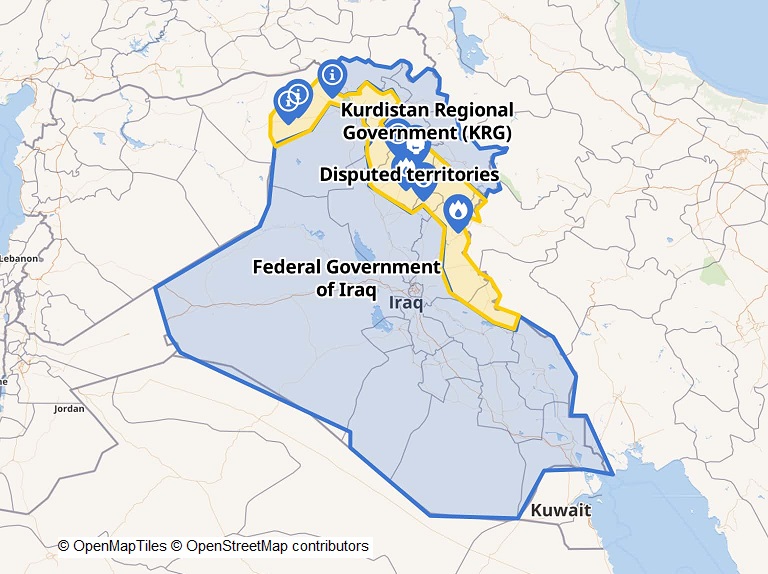1.2K
Kirkuk
- According to a report by IQ NEWS, the North Oil Company (NOC) announced “stable” oil production in April. The oil production averaged 300,000 barrels per day; 100,000 barrels per day were exported to Turkey via Kurdistan’s pipeline to Turkey’s Ceyhan port, 8,400 bpd exported to Jordan via tank truckers, and the remaining were distributed on local refineries and domestic demands. On April 17 Da’esh terrorists exploded an oil field in Bai Hassan which caused a temporary disruption in the production of 2,500 bpd.
- Seven Kurdish parties in Kirkuk held their fourth meeting in an attempt to establish a united list for the upcoming parliamentary election set to hold on October 10, 2021. However, once again the parties failed to reach agreements. The Democratic Party of Kurdistan (KDP) and the New Generation party did not participate in the meeting. The KDP branch of Kirkuk remains shut down and their party has not returned to the province since October 16, 2017. Kirkuk province is divided into three electoral districts: North, Middle (City of Kirkuk), and south, unlike previous elections where each province was one electoral district.
- Kirkuk’s municipality warns of an environmental disaster due to their incapability to collect waste and trash from the neighborhoods after a “budget cut” by the Iraqi minister of finance. The city has seen waste spread on its streets and residential neighborhoods after weeks mainly due to ill plans by its administration and the acting governor. The city has also seen a dramatic increase in coronavirus cases. A pro-Turkey politician of the Turkmen Front, Arshad Salihi accused the acting governor Rakan Saed of corruption and said the Iraqi government’s pledges to crack down on corruption were never implemented. Since October 16, 2017, the Iraqi Commission of Integrity has filed 70 corruption cases against Kirkuk’s administration
- On April 25, the police arrested a drug cartel run by a family in the city. According to police the group has dealt with Crystal Meth and banned Tramadol drugs. Iraq has seen a severe increase in drug use and trade, imported from Iran. Since October 16, 2017, when the Iraq government with Iranian-backed militias removed the elected administration and the Kurdish forces from Kirkuk, the city became the main route for drug dealings.
- An electricity shortage caused a large fire in a shopping mall named “Shahi Zyan” in the city. Last week three other major fires took place in Iraq including a hospital in Baghdad that killed 83 patients, a hospital in Wasit province, and a market in Saladin Province.
- As the security continued to deteriorate in the disputed territories, Da’esh IED wounded five federal police officers between Daquq and Rashad. Further, on Thursday, a suicide terrorist blew himself up in front of the National Security Service in Kirkuk. No casualty was recorded.
Tuz Khurmatu
- On April 27 a Da’esh attack on the Iraqi army resulted in the injury of two soldiers after clashes with light weapons.
Khanaqin
- On Tuesday, Da’esh terrorists attacked the Iraqi forces settled in the west of Khanaqin, near Karim Dawdian village. During the attack, two civilians were injured. The security vacuum in Khanaqin has increased Da’e’sh attacks since October 16, 2017, when the Kurdish forces were removed from the region.
Shingal (Sinjar)
- Tensions arose once again between the Iraqi military and the Sinjar Resistance Units (YPS) in Til Ezer (Qahtaniyah) last week. The Iraqi military rejected entry to a convoy of the YPS in attempts to purge armed groups from the Shingal region especially due to a recent agreement between Baghdad and Erbil over the security file in the area. Both Baghdad and Erbil accuse the YPS of being a branch of the Kurdistan Workers’ Party (PKK).
- According to the Spokesperson for the Iraqi Commander-in-Chief Yehia Rasoul, 7447 displaced Yazidis in the Kurdistan region returned to Shingal and Zumar. Among those, about 4,000 were from Shingal.
- Following the criminal court’s decision in Nineveh to execute four Yazidi Kurds on murder charges against two Arab citizens, hundreds of Yazidis protested the decision. The Yazidi Kurds accuse some Sunni Arabs of collaborating with Da’esh terrorists in 2014 when tens of thousands of Yazidis were enslaved by the terror organization. Ethnic and religious tensions remain high in the area.

